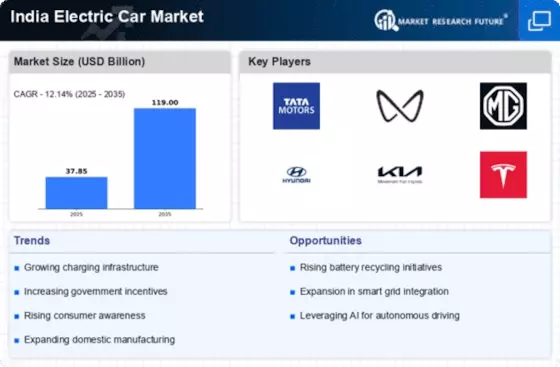Top Industry Leaders in the India Electric Car Market
*Disclaimer: List of key companies in no particular order
Top listed companies in the India Electric Car industry are:
BMW Group (Germany)
Daimler AG (Germany)
Toyota(Japan)
Volkswagen (Germany)
Renault Group (France)
Ford Motor Company (U.S.)
Mahindra & Mahindra (India)
IATA motors (India)
Hyundai (South Korea)
MG Motors (U.K.)
Ola Electric (India)
India's electric car market is electrifying, experiencing meteoric growth and attracting a bevy of established and ambitious players. This dynamic landscape boasts distinct strategies, evolving trends, and fierce competition, all vying for a slice of the pie. Understanding these elements is crucial for any player navigating this burgeoning market.
Key Players & Strategies:
• Tata Motors: The incumbent champion, Tata Motors enjoys a dominant 72% market share with its Tiago, Nexon, and Tigor models. Leveraging its extensive service network and familiarity with the Indian consumer, Tata focuses on affordability and practicality.
• MG Motor India: Challenging Tata's dominance is MG Motor with its premium ZS EV. Their strategy hinges on offering feature-rich vehicles and innovative marketing campaigns targeting tech-savvy urban millennials.
• Mahindra & Mahindra: This established player is making waves with its recently launched XUV400, focusing on performance and range anxiety reduction. Additionally, Mahindra leverages its strong presence in the commercial vehicle segment to build charging infrastructure.
• Legacy Automakers: Global giants like Hyundai, Maruti Suzuki, and Honda are entering the fray with their Kona Electric, Wagon R Electric, and e:S respectively. Their established brand reputation and existing dealership network offer a distinct advantage.
• Startups & New Entrants: Several nimble startups like Ather Energy, Ola Electric, and Euler Motors are disrupting the market with innovative offerings like scooters and affordable two-wheelers. Their focus on technology, direct-to-consumer models, and customization is attracting young buyers.
Market Share Analysis:
Factors influencing market share are multifaceted:
• Vehicle Range & Performance: Longer range and faster charging capabilities are critical selling points, with companies like Mahindra addressing range anxiety through the XUV400.
• Pricing & Affordability: The price-sensitive Indian market necessitates competitive pricing. Tata caters to this need with its Tiago EV, while startups like Ather offer flexible financing options.
• Charging Infrastructure: Limited charging infrastructure remains a roadblock. Players like Mahindra are addressing this by partnering with state governments and investing in their own charging networks.
• Government Policy & Incentives: Supportive government policies, including FAME-II subsidies and tax benefits, significantly impact demand. Players actively lobby for favorable policies that benefit their segment.
New & Emerging Trends:
• Focus on Two-Wheelers: The two-wheeler EV market is booming, driven by affordability and urban mobility needs. Startups like Ola Electric and Ather Energy are leading this charge with innovative design and technology.
• Subscription & Leasing Models: Flexible ownership models like subscriptions and leasing are gaining traction, particularly among millennials. This opens up the market to a wider audience without significant upfront investment.
• Battery Technology Advancements: Rapid advancements in battery technology are increasing range and reducing charging times. Companies are actively collaborating with battery manufacturers to secure access to these advancements.
• Localization & Cost Reduction: Localizing components and manufacturing is crucial for affordability. Players like Tata are heavily investing in domestic production to drive down costs and compete effectively.
Overall Competitive Scenario:
The Indian electric car market is fiercely competitive, with established players, global giants, and agile startups vying for dominance. Players are constantly innovating, adapting their strategies, and capitalizing on new trends to capture market share. Success lies in a blend of affordability, performance, robust charging infrastructure, and catering to evolving consumer preferences. The race is on, and only the most adaptable and forward-thinking players will claim victory in this electrifying arena.
Latest Company Updates:
Mahindra & Mahindra:
Announced plans to invest INR 100 billion in a new EV manufacturing plant in Pune, Maharashtra. (Jan 2024, Economic Times)
MG Motors:
Holds the second position in the Indian EV market with a 10.8% share, driven by the success of the ZS EV. (Dec 2023, India Briefing)
Volkswagen Group:
Partnering with Mahindra for EV production in India, with plans to launch Skoda and Audi EVs in the future.










